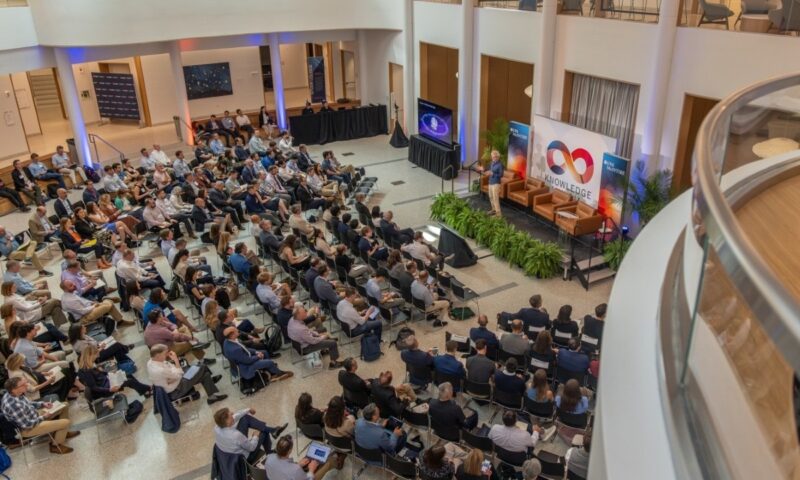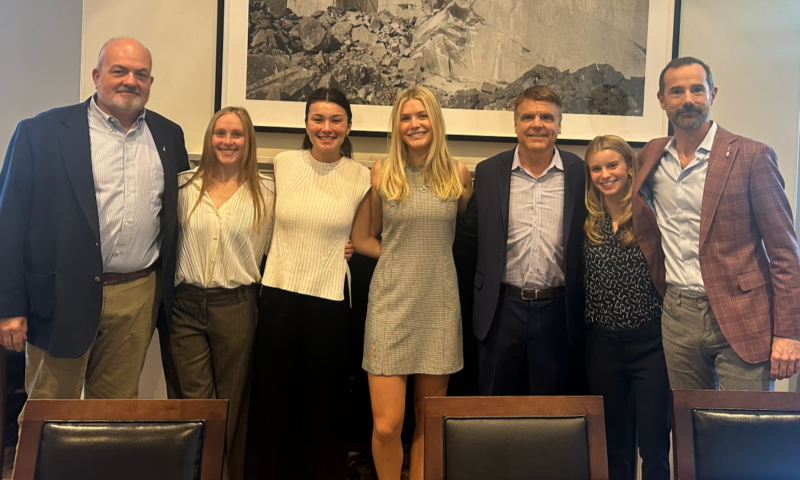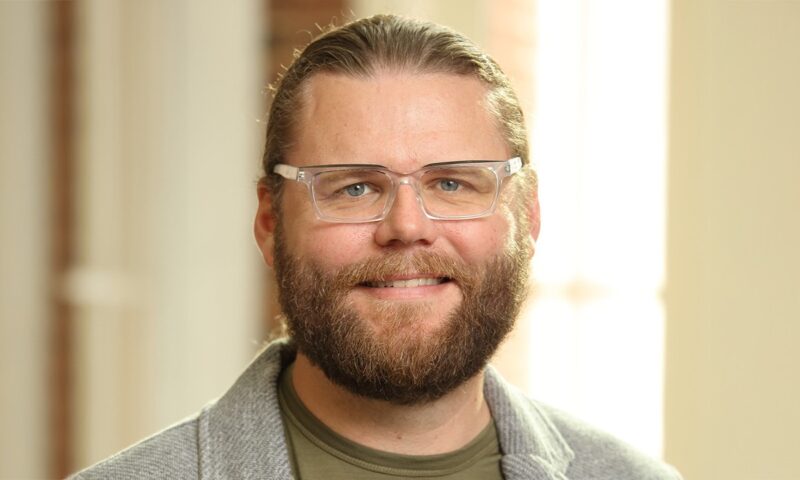This fall, Washington, DC, native Jacob Melman-Rogers will start the MBA program at The University of North Carolina’s Kenan-Flagler Business School. He’s planning to focus on innovation and technology management—a potentially unexpected left turn for someone who graduated from UVA with a degree in Spanish. But he also minored in Entrepreneurship, concentrating in Innovation in Business.
That he’s headed to grad school and not the job market or entrenched in his own venture is hardly the point, especially when one considers that he’s already gone through the real-life ups and downs of rapidly launching a company that didn’t survive.
“In 2020, during the pandemic, I founded an education technology company. At that time, I didn’t know anything about entrepreneurship. I didn’t know anything about education. And frankly, I didn’t really know anything about technology,” Melman-Rogers admits. He and his co-founder, McIntire Class of ’21 grad Ed Radion, launched a product, had active users, and participated in the Darden School’s Venturing Project Squared incubator. “Ultimately, it was not financially successful, but it’s what spurred my interest in entrepreneurship and the startup venture ecosystem. My co-founder and I were very much just building the plane as we flew it. It was a great experience, because it allowed me to see challenges as opportunities rather than obstacles.”
The benefits of having an entrepreneurial mindset—and the excitement of launching a venture—took hold.
Motivated to Make Change
Having arrived a transfer student from Tulane, Melman-Rogers found UVA welcoming and kind, providing an easy transition to life on Grounds, socially. Academically, he was clueless about what to study.
“I took courses in almost any subject that you could think of in the College [of Arts & Sciences], but I didn’t find something that I was passionate about that also felt like would be a good degree to have going into the job market.”
After consulting professors, family, and friends, he was convinced by their advice to simply study what he found interesting. Having enjoyed Spanish since he was in middle school, he chose to pursue a degree in it.
“And I am so happy that I did. Because I learned that you don’t need to have a degree in a certain subject to go into that field,” he says. “I’ve worked for a bunch of tech startups, venture firms, and angel investors, but I didn’t take any high-level Economics classes: I learned by going and doing.”
Melman-Rogers then decided to apply to the minor in the fall of 2021, after taking that semester off to work on his startup.
“Up until that point, the coursework that I had completed hadn’t really prepared me for being a founder or given me many tools that I found useful in that process,” he says. He enrolled in the program, hoping to find strategies to make better progress in ventures and to develop a fuller understanding of entrepreneurship. “I wanted to learn skills that would help me be a more efficient and deliberate founder in the future.”
As a student, he was motivated by the thought of innovation opportunities in education—in tech and beyond—to improve the disparities among educational systems across the globe.
“In order to move forward as a global community, we need to be giving young people the tools that they need to meaningfully contribute and live fulfilling lives. And in that respect, I also care a lot about criminal justice reform, too,” he says, explaining that the American prison system needs to do a better job preparing people to live meaningful lives and contribute to society in positive ways. “I’m passionate about education, technologies that change the world for the better, and criminal justice reform,” he says.
Why Entrepreneurship?
Melman-Rogers believes that, at its core, entrepreneurship is simply about just solving a problem: “It’s a problem that you face personally and then creating a solution to that and sharing it with the world. You don’t have to end world hunger or eradicate malaria. But if you can just find a solution to a real problem, and even if you just improve the world marginally? There’s nothing better than that.”
Unashamed of enjoying its more heart-pounding possibilities, he’s also drawn to entrepreneurship because of its inherent risks, the high chance of failure, and the outsized rewards that await those who prevail. He notes how many early-stage founders could otherwise be earning a much larger salary elsewhere. “But it’s that grit and determination that make the job more than a job; it’s all-consuming,” he says.
What has stayed with him about the subject—and allowed him to excel in it—can be traced back to a conversation he had with McIntire Professor and Entrepreneurship Minor Director Eric Martin. “After class, he asked me what I thought about luck and if I believed in it,” Melman-Rogers recalls, recounting how he said that while he believed in the concept to a degree, he didn’t believe it played a particularly big role in outcomes. “Everybody gets lucky. Sometimes everybody gets unlucky, and generally it just evens out,” he thought. That’s when Martin shared a story that changed his opinion.
“He told me about the company that he founded in the 1990s, which exited literally weeks before the dot-com bubble burst in the early 2000s,” Melman-Rogers says. “He said that if they had moved it at 99% of the pace that they did, they probably would have gone bankrupt, and never would have been acquired if they had hit just one roadblock that they hadn’t.”
When he asked again if he didn’t believe in luck, Melman-Rogers says he couldn’t argue with that kind of story.
“What it goes to show is that one moment of luck can trump a thousand moments of unluckiness—and vice versa, too,” he says. “That can be almost universally applied in entrepreneurship: One team member can have one idea that completely changes the course of the company, or a meeting with the potential client can be botched if one thing goes wrong.”
Surprising Lessons
Some lessons he learned in the Entrepreneurship Minor came through trial and error. He cites his Capstone class in spring 2023: “It taught me to think big—but to also be realistic.”
One of his teammates from Brazil offered an idea based on his relative back home who owned a reservoir. The idea? A company that would put floating solar panels on reservoirs in the locale, with the goals of providing power and mitigating evaporation in the region.
“I thought it was a great idea and still think it’s a great idea. But after a few weeks, we realized that was not feasible within the timeframe of the course, and we did not have the resources. We had to pivot and create totally different companies starting from square one, probably five or six weeks into the course,” he says.
But perhaps one of the most critical exercises came to Melman-Rogers in Martin’s Managing Innovation course.
For the final project, Martin tasked students with pitching an innovative way to improve the customer experience for the Lowe’s paint department.
“At first, I thought, ‘Paint? What’s there to innovate about paint?’ But all the groups in our class came up with these solutions to improve that process of buying paint. That showed me how innovation is possible everywhere,” he says, pointing out that many times, the best innovations arrive in industries or verticals devoid of glamour, mundane areas that most wouldn’t even consider for inventive solutions.
As Melman-Rogers prepares to pursue his MBA, he feels that the number one skill the Entrepreneurship Minor provided to him is simply becoming more self-sufficient.
“We’re a lot smarter than we think we are, and a lot more capable than we think we are.”
Case in point: While Melman-Rogers worked at fintech startup Quantbase, one of his responsibilities included building a bot to run its online community on multiple social platforms. There was one problem. “I had no experience,” he says, “but through YouTube videos, Coursera, code editors, and AI tools, I was able to put this thing together. It worked fine, and here I am, a Spanish major; what do I know about coding?”
A few of his minor classes took advantage of no-code or low-code tools to create prototypes of websites and landing pages in a single afternoon, giving him the ability to iterate quickly, a crucial short feedback loop that early-stage companies rely on to advance their ideas.
Yet despite the idea that the Entrepreneurship Minor might wholly focus on founding startups, Melman-Rogers is proof positive that it’s much more than that: “The minor really taught me how to learn for myself and to take creative approaches to solving problems.”



